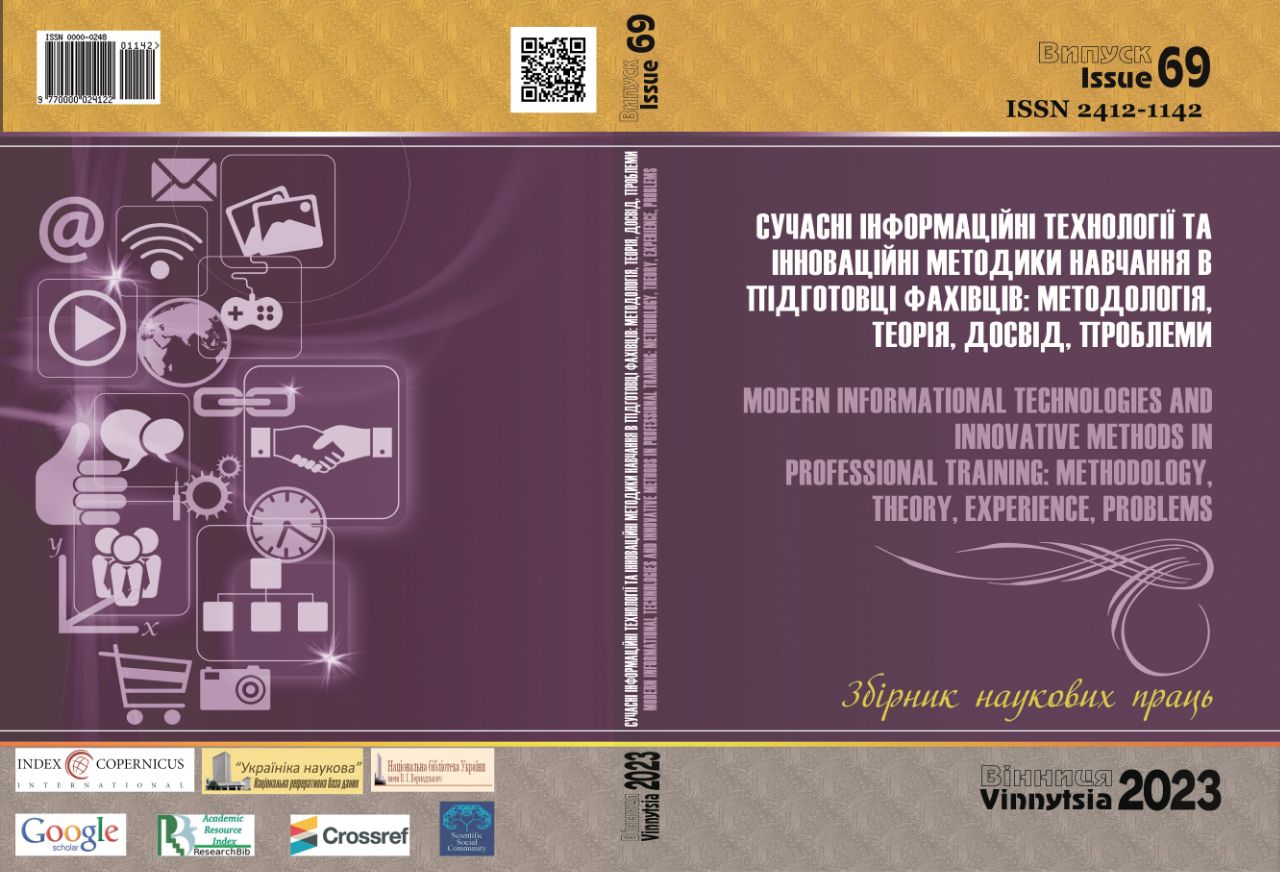STAGES OF PROJECTING IMERSIVE TRAINING
DOI:
https://doi.org/10.31652/2412-1142-2023-69-55-61Keywords:
immersive learning, virtual reality, augmented reality, interactive technologies, stages of learning design, educational technologiesAbstract
This article is devoted to the design of immersive learning in order to create an in-depth, exciting, and effective learning experience for students of general secondary education institutions. The author clarifies the concept of «immersive learning» as an innovative pedagogical technology in education that provides students with a deep immersion in learning. There are also five stages to designing immersive learning: acquaintance with immersive means, acquaintance with the immersive environment, interaction in the immersive environment, individual or group practical activity, evaluation, and feedback. These stages will help to develop a multidimensional, integrated approach to learning and involve students in the learning process. The article explores digital immersive technologies that can be virtually realized and are most useful for attracting students' attention and maintaining their interest in learning. It is established that an important aspect of the dictation of immersive learning is the analysis of the target audience, namely, as an age group of students, their level of knowledge, educational needs, interests, sociocultural context, learning styles, and other factors that may affect their learning material. Emphasizes the importance of immersive learning as a pedagogical technology to increase the understanding and learning of educational material by students and highlights the benefits of such learning for students of general secondary education institutions, namely: interest, motivation, immersion process, personalization, real experience and communication, social skills, and support. The author also warns that technological, organizational, and financial challenges need to be addressed in order to successfully implement intensive learning. With proper support and investment, this approach can change the paradigm of modern education and provide a quality and effective learning process for future graduates of general secondary education institutions.
Downloads
References
Sandoval-Henríquez, F. J., Badilla-Quintana, M. G. (2022). How elementary students experience the use of
immersive technology. International Journal of Learning Technology, 2(17), 115-132. doi:
http://doi.org/10.1504/IJLT.2022.125076.
Dengel, A. What Is Immersive Learning? (2022). 8th International Conference of the Immersive Learning
Research Network (iLRN), Vienna, Austria, 1-5, doi: http://doi.org/10.23919/iLRN55037.2022.9815941.
Dengel, A., Mägdefrau, J. (2020) Immersive Learning Predicted: Presence, Prior Knowledge, and School
Performance Influence Learning Outcomes in Immersive Educational Virtual Environments, 6th International
Conference of the Immersive Learning Research Network (iLRN), San Luis Obispo, CA, USA, 163-170, doi:
http://doi.org/10.23919/iLRN47897.2020.9155084.
Rotkonen, E., Suero Montero, C., Pope, N., Sutinen, E. (2022) Is It Real? – Learners’ Perceptions on TeleImmersive 3D Video Technology and Its Further Use in K-12 Education. Digital Transformation of Education
and Learning - Past, Present and Future. OCCE 2021. IFIP Advances in Information and Communication
Technology, 642, 234-246, doi: http://doi.org/10.1007/978-3-030-97986-7_20.
Kuhail, M.A., ElSayary, A., Farooq, S., Alghamdi, A. (2022) Exploring Immersive Learning Experiences: A
Survey. Informatics, 9, 75. doi: http://doi.org/10.3390/informatics9040075
Литвинова, С.Г. Готовність учнів закладів загальної середньої освіти до використання віртуальної
реальності в освітньому процесі. (2022) Перспективи та інновації науки. (Серія «Педагогіка», Серія
«Психологія», Серія «Медицина»), 4(9), 218–230. doi: https://doi.org/10.52058/2786-4952-2022-4(9)-
-230
Литвинова, С.Г., Сороко, Н.В. (2022) Готовність учнів гімназій до використання доповненої реальності в
освітньому процесі. Науковий вісник Ужгородського університету. Серія: «Педагогіка. Соціальна
робота», 1(50), 158-164. doi: https://doi.org/10.24144/2524-0609.2022.50.158-164
Pirker, J., Dengel, A. (2021) The Potential of 360-Degree Virtual Reality Videos and Real VR for Education A
Literature Review. IEEE Computer Graphics and Applications, 4(41), 76-89, doi:
https://doi.org/10.1109/MCG.2021.3067999.
Thompson, B. (2021) Work-in-Progress–LIVE: Model for Learning in Interactive and Immersive Virtual
Environments, 17th International Conference of the Immersive Learning Research Network (iLRN), Eureka,
CA, USA, 1-3, doi: http://doi.org/10.23919/iLRN52045.2021.9459362.
Downloads
Published
Issue
Section
License
Copyright (c) 2023 Литвинова Світлана Григорівна

This work is licensed under a Creative Commons Attribution 4.0 International License.

